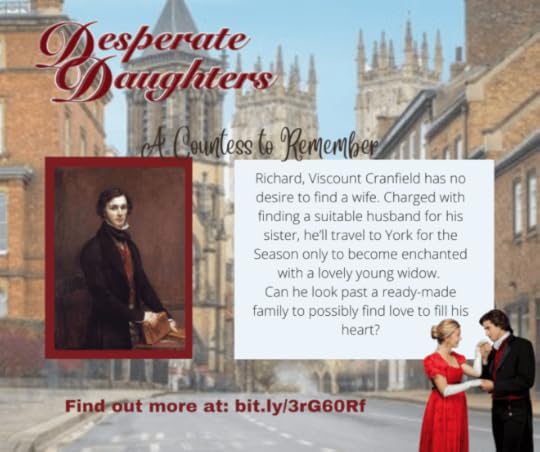Jude Knight's Blog, page 47
April 5, 2022
Scandalous gossip on WIP Wednesday
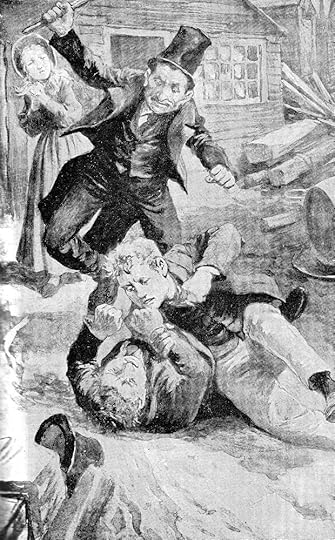
In today’s excerpt, my heroine’s step-son gets into a fight at university, and is sent down.
In the drawing room, Geoffrey prowled while the tea makings were brought in. When the maids had left the room, Regina patted the seat beside the couch.
“Come and sit down, my darling.”
Geoffrey straightened. “I would prefer to stand, Mother.”
Regina inclined her head. “As you wish.”
“The short story is that I was sent down for fighting. I – Ah – broke someone’s jaw. That’s why I have no money. I gave it all to pay for the doctor and for the nurse who was going to look after him while he recovers.” Geoffrey swallowed, and shuffled from one foot to the other.
Regina waited. Let him tell his story in his own words, and then ask questions.
After a moment or two, Geoffrey took a deep breath and continued. “The Chancellor said that was part of my punishment for resorting to brute violence instead of using my brain. He told me to go home until my hand healed, and to talk to you about what Richard Deffew said.” He sat down like a puppet with its strings cut, flopping any old how into a chair.
“Richard Deffew?” Regina commented. “That would be the gentleman whose jaw you broke, I take it.” Mr David Deffew had mentioned having a nephew at Cambridge.
Geoffrey nodded. “Although he is no gentleman, Mother. I did not mean to hurt him so hard, although he deserved it.”
Regina remembered the threats David Deffew made when he tried to coerce her into an elopement all those years ago. She had a good idea of what he might have said to spark Geoffrey’s temper. Her boy was generally easy-going and slow to anger, but his wrath burned hot when it did erupt. She took a deep breath. Best to know what was said, before she at last told Geoffrey the truth of his origins.
“What exactly did Deffew say?”
Geoffrey blushed. “I won’t repeat his foul words, Mother. But in essence, he said you are my mother in truth, and you were married off to Father — Gideon Paddimore — because you were ruined beyond recovery, and he was your father’s…” He hesitated, looking for a word. “Your father’s intimate friend.” His blush burned deeper.
Regina raised her eyebrows. She had expected Gideon’s reputation to be called into question, but not her own. “I had just turned fifteen when you were born,” she pointed out. “Rather young to be steeped in sin.”
“Yes,” Geoffrey said, but the relief in his tone indicated that the accusation had bothered him. “I knew he was lying, especially when he said Uncle William must be my father because I look so much like him.”
Regina’s eyebrows shot up further. “That would have made him a very precocious twelve-year-old,” she said. “To set the record straight, Geoffrey, I did not give birth to you, and William is not your father.” She paused, wondering how to broach the truth.
Geoffrey gave her an opening. “Do you know, Mother? Who my real mother and father were, I mean. Only, I do look like Uncle William.”
Regina took a deep breath. Gideon, I wish you were here. “You know that we always told you that your father took you into his arms, his heart, and his life when you were a few hours old.” She held out a hand that trembled rather more than she wished.
Geoffrey took it. “Yes, and you did the same when I was two years old and you married Father.”
“I did,” Regina agreed, and continued with what she needed to say. “Gideon was there that day because, when the mother who gave birth to you died shortly afterwards, the midwife sent for her lover.”
Geoffrey’s hand gripped hers and his eyes burned. “My father.”
Regina nodded. “Your father. Gideon was with him when he got the message. Your father was married, Geoffrey. He could not take you home, he refused to put you into an asylum, and he was reluctant to leave you to paid care. But Gideon had already, as he told you, taken you into his heart. He claimed you as his ward, and from that moment on, you were his son and everything but blood.”
Geoffrey’s focus was on the man who had given him up rather than the one who had taken him in. “Did my real father want nothing more to do with me?” he asked, a tremble in his voice.
“He visited you often, my darling, until the day he died when you were only two years old.” Regina had given Geoffrey a handful of clues, but he still didn’t put them together.
“Father told you all of this.” It was a statement, not a question.
Regina nodded again. “Certainly. Once we had agreed to marry.”
April 3, 2022
Tea with Doro

The Hampton Hotel, Harrogate
September, 1815
Doro Bigglesworth was rather startled when her employer, Horace Crowley, stopped by her office. Office may be too grand a word. Doro managed the kitchen and catering service bookkeeping from a windowless room no bigger than a linen closet.
“A guest wishes to see me?” Doro asked.
“Aye. One of the posh guests in the Grand Duchess Suite.” Crowley started to laugh. “Full fancy duchess she is with an entourage. She must think we’re all upper folk here. She called you Lady Dorothea. It was all I could do not to laugh! You best go see what the grand dame wants. Try to act a posh lady when you do.” He left chuckling.
Doro’s heart sank. She kept her title to herself here. Socially prominent guests would be horrified at an earl’s daughter working for wages. Worse, Crowley and the other staff would treat her as an oddity. She’d lose their comradery or, worse, find herself unemployed.
A young woman, wearing a plain but well-made afternoon dress, opened the door to Doro’s knock.
“I’m, ah, Dorothea Bigglesworth. Someone wishes to see me?” she asked, hoping it was a mistake.
“Thank you for coming, my lady. Her Grace will be pleased.” Before Doro could think, deny, or react, the woman showed her into a sitting room, and she was confronted by one of the most powerful women in Britain. The Duchess of Haverford smiled across at her.
The duchess appeared much as she had six years before when they had met at a house party. She had the inherent dignity of a duchess and the profound beauty of a woman whose character and bone structure combined to allow her to age well. Their encounter had been brief, and Doro couldn’t imagine what this august person might want with her.
“It is you, Dorothea! I was certain I recognized you working in the dining room this morning, but I feared my memory might be faulty.”
Doro sighed. Most people saw what they expected to see and would have seen only a hotel employee. Her Grace was sharper than most.
“Please come and sit with me for a while. I suspect you have a story to tell, and I’d like to hear it.” The duchess glanced at her companion, who bowed out and promised tea. Doro doubted she would be there long enough for it to come up from the kitchens, but she sat across from Her Grace as requested.
“This hotel is charming, but it must be fine indeed if it can manage to include an earl’s daughter among its employees,” the duchess said, sympathy and curiosity radiating from her expression in equal measure.
“They don’t know about my status, Your Grace. My employer didn’t believe the message. He assumed you were mistaken, and I would prefer to keep it that way,” Doro said. “I know what I’m doing isn’t the done thing, but I want neither pity nor scorn, and most people—”
“I am not most people, and I have no doubt you have your reasons. Dare I ask you to share them with me?” the older woman asked.
Tea appeared miraculously from somewhere in the suite, along with some rather lovely biscuits. If Doro hadn’t been so distressed, she might have asked the source and the recipe.
“I’m not the dragon many call me, Dorothea. If you are in distress, perhaps I could help.”
The sympathy, the tea, and some magic all the duchess’s own, soon had Doro spilling out her heart. The entire haut ton must know about her father’s death, his lack of an heir, his five wives in succession, and his overabundance of daughters. The rest, too embarrassing to bandy about, had been less well known. She explained about the lack of provision in her father’s will, her distant cousin’s rapid seizing of her childhood home, and his vile wife’s treatment of Patience, her stepmother and good friend.
“All of you? Living in a tiny cottage in Starbrook?”
“Yes, Your Grace. Patience has a toddler and two half-grown stepdaughters to raise. Most of my sisters live there still, but we have all tried to fend for ourselves, and, where possible, send her money to help with expenses.” Doro leaned forward urgently. “Please know that I don’t mind it. I board here, freeing board and space. I rather like working. It gives me pride, and I love Patience. We’re all doing what we can.”
“You never wished for a come-out? Marriage? A home of your own?” The duchess asked.
“Once. Mourning followed by poverty made a Season impossible. That time has passed, however, and I am content.” She was. Doro sincerely meant it. Mostly. Except walking out with Mr. Clarke on her half days had allowed hope to creep in to her lonely heart. She saw no reason to share that bit of information.
The Duchess of Haverford appeared skeptical but was too generous to voice her doubts. She put down her teacup. “Thank you for sharing your situation. I’m not sure what I can do to help you or your stepmother, but know that I will keep you all in mind should an idea occur.” She raised a brow as a thought occurred. “Lady Patience is the cousin of Lady Rose St Aubyn is she not?”
Doro agreed that was true, but could see no way it mattered. The duchess brushed it aside.
“I regret I may have complicated your life, Dorothea. What will you tell your employer?”
Doro grinned. “I’ll tell him you discovered that The Hampton’s famous current buns were my doing and you wanted my recipe. I’ll tell him I refused. We can’t have Hampton’s treasures bandied about.”
The duchess laughed gleefully. “I admire your backbone, Dorothea Bigglesworth. You are a woman of strength and courage.”
Doro returned to her little cupboard with a song in her heart. The office may not be much, but it was her domain and she, Doro Bigglesworth, was a woman of strength.

Doro Bigglesworth is the heroine of Caroline Warfield’s “Lady Dorothea’s Curate”, a story in Desperate Daughters. On preorder now. Only 99c until publication.
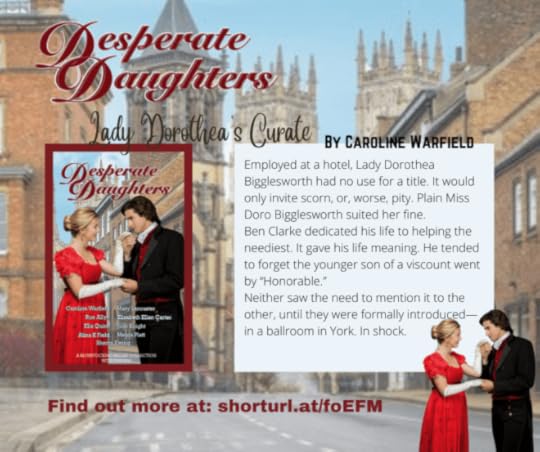
April 2, 2022
Spotlight on “The Butler and the Bluestocking” in Desperate Daughters
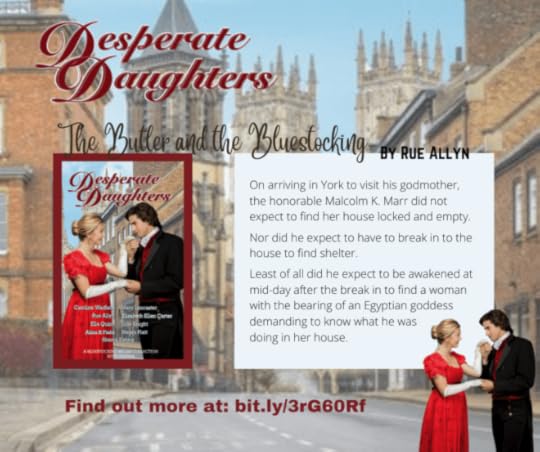
The last thing Bess expects to find at their borrowed townhouse in York is a stranger claiming to be a butler. She has every reason to disbelieve him, but her family is in desperate need, so she squelches common sense and offers him a job on the spot. Pray heaven, she won’t regret her decision.
On arriving in York to visit his godmother, the honorable Malcolm K. Marr did not expect to find her house locked and empty. Nor did he expect to have to break in to the house to find shelter. Least of all did he expect to be awakened at mid-day after the break in to find a woman with the bearing of an Egyptian goddess demanding to know what he was doing in her house.
And 8 other great stories.

“Unhand her, you cur.”
Bess ceased her struggles.
Mrs. Crewe had arrived, and from the clatter of footsteps, she had the watch with her.
“Of course.” He set Bess away from him, but his gaze never left her face.
Bess shifted to take in the entire scene. Yes, there stood Mrs. Crewe, a fire poker in her raised hand. Behind her framed in the doorway, stood two watchmen, one just arriving behind and to the right of the other.
“Cor Bill, who’s the toff?” queried the newest arrival. “And who’s the lady toff with him?”
“I dunno, Jim. He could be the butler for all I know. When Mrs. St. Aubyn sent word she was leaving, she said nothing about if her servants would stay or not.”
The remarks drew her attention and the stranger’s.
Bess managed to stifle into a snicker the irresistible urge to laugh.
The stranger’s tawny eyes gleamed, and all his teeth showed.
No doubt about it. Those strong white teeth prove he is smiling.
“Who are you, and why are you here?” demanded Mrs. Crewe.
The stranger looked a question at Bess.
Bess turned to her housekeeper and the curious faces of the watchmen behind her. “Mrs. Crewe, I believe we’ve had a misunderstanding. Would you be so kind as to show the watchmen out?”
“Indeed, Mrs. Crewe. Here are vails for their trouble.” The supposed butler stepped forward, coins in hand to give to the housekeeper, who gave the stranger a narrow-eyed look.
“Are you certain, my lady?”
Bess nodded. “Quite.”
The stranger, his hand still outstretched, looked back over his shoulder at her, that smile doing very odd things to her stomach.
“There is no danger here.” Bess assured her housekeeper and the watch. Why she now believed the stranger represented no hazard to her or her family, she could not have said. The important thing was to get the watch out of the house before anything else could happen.
“Hmpfh,” uttered Mrs. Crewe. In taking the coins, she was forced to lower the poker, but she did not release it. “I’ll be back instantly, my lady.” With that she turned and ushered the watchmen before her toward the front of the house.
“I think you’d best explain yourself, Mr. . . .” She wondered what concoction of bouncers the man might create to explain his presence here. One thing she knew for certain, he was no butler.

See the project page at the Bluestocking Belles’ website for more information.
Desperate Daughters is on preorder for publication on 17 May. Order now to get the preorder price of 99c
March 31, 2022
Regency era costumes
I love the information you can find online. Regency era women’s fashion, anyone?
March 29, 2022
Random bits of knowledge on WIP Wednesday

One of the things I love about writing historical romances is the research. Not just the big important stuff, but the odd bits of knowledge that I come across or look up for a particular story. Do you have an example in one of your books? I’d love you to share in the comments. Mine is the opening to my next story for newsletter subscribers. My newsletter is going out next week, and the story is called The Easter Bonnet.
“Come on, Millie. Put that away and join us,” Sadie tempted.
Millie shook her head. “I can’t,” she said. “I have to finish this.” She held up the bonnet she was trimming.
“You can do it in the morning,” Sadie insisted. “We’re going to drop into the pub for a tot of gin and a bit of a chin wag.”
“I have to deliver it on my way home,” Millie countered. “Madam said the lady is leaving for the country in the morning, and wants to take it with her.”
“Madam should do it herself then.”
Madam was with child, but Millie had been told that in confidence. “I don’t mind,” she told Sarah. “It is going to be very pretty when it is finished.”
Sadie stared at her for a moment then shrugged. “Another time, then.” She whirled around and in moments the door shut behind her and Millie was alone.
She finished attaching the edging. The bonnet was formed in twisted straw, edged in a ribbon that apparently matched Lady Paula Temple’s favourite walking dress. Lady Paula planned to wear them both to Easter services in her home village, for the delight—to hear the lady tell the tale—of the entire community.
Millie picked out another length of ribbon of the same colour but much wider, and began to pleat and pin it around the base of the bonnet, so that the straw would not catch in the lady’s coiffure. Coiffure. Millie said the word out loud, shaping it with lips and tongue. Coiffure was what the upper classes called their hair dos. It must be nice to be a wealthy beauty with an indulgent father and a whole battalion of suitors.
A further length of ribbon, this one in a slightly darker shade. It would go over the join between brim and bonnet, then be gathered into a rosette on each side where it met the base. Two more lengths from the same roll would form the ties to hold the bonnet on.
Quick but careful stitches soon had those in place.
Millie had made herself a bonnet in a similar design, though of much cheaper materials and in different colours. Madam would not object to Millie copying the design, as long as there was no chance of a customer recognising the copy.
Millie snorted. Fat chance of that. The customers who could afford Madam’s creations did not see such lowly beings as a milliner’s assistant.
The silk flowers came next. Pink moss roses, symbolizing perfect happiness and also the confession of love. Daisies for innocence. Blue cornflowers for hope. Myrtle for good luck. Lady Paula had specified these particular flowers. Millie wondered what message she was trying to send and to whom. But perhaps Lady Paula just liked the colours.
Millie secured a single rose, three daisies, and two cornflowers inside the brim, where they would draw attention to Lady Paula’s eyes. The rest would form—soon did form, thanks to Millie’s clever needle—a cascade over the other side, covering the join between brim and crown.
There. Done. Millie set the bonnet back on the hat block and stood back. She walked all the way around where it sat on the table. Yes. It would do.
Her own version of the hat was trimmed with violets. Innocence, modesty, remembrance. The violets were the least damaged of all the silk flowers being sold at half-price, because they had been damaged by an accident with a bucket of water. She had parted with a hard-earned a sprig of myrtle at full price, because good luck was worth it.
March 27, 2022
Tea with the Duke of Bourne

The Duke of Bourne had the usual arrogance of his rank—bred in the bone and trained from the cradle, but he also had excellent manners. When they chanced upon one another in Miss Clemens bookstore, Eleanor invited him to take tea with her so that she could ask after his aunt and his sister. He agreed immediately and without any visible signs of racking his brains to think of an urgent engagement elsewhere.
He was also very happy to talk about his women folk. “Lady Philidia is well, Your Grace. She is staying with friends in the country at the moment. We both miss Clarissa while she is away at school in Yorkshire, but my aunt most of all, perhaps. They are very close.”
“My regards to her when you next speak, Bourne. And how is Lady Clarissa?”
“My sister seems to be enjoying her school, at least as far as I can tell from her letters. I plan to open our estate up there for Christmastide, so we can enjoy the holiday together. I shall tell her you ask after her.”
“Do that, Bourne. And let her know that Frances is still talking about the fortnight they spent together at the Chirburys in the summer.” Eleanor chuckled. “Seven girls, all on the verge of putting away their childhood and beginning to explore stepping into their future role as young ladies! I quite understand my niece’s motivations in suggesting the house party, for they will already have friends when they face their first season, but I imagine keeping their feet on the ground and their high spirits under control was quite a challenge.”
“Clarissa will have friends from school, too,” Bourne agreed. “Not that I wish to think of her on the marriage mart, ma’am. To me, she is still my sweet little sister.”
“And so she always will be,” Eleanor told him. Her eyes twinkled. “Perhaps you should think of marrying, Bourne. A wife would be a huge boon when it comes to your sister’s debut. You would be able to leave her and Lady Philidia to be her guard dogs while you retire to the card room with the rest of the gentlemen.”
Bourne actually paled. “An interesting idea, Your Grace,” he managed to say. Which, interpreted, meant, “Over my dead body, you interfering old biddy.”
Eleanor smiled and offered him another cup of tea.

The Duke of Bourne is the hero of Meara Platt’s “A Duke for Josefina”, a story in Desperate Daughters. On preorder now. Only 99c until publication.
March 26, 2022
Spotlight on “Concerto” in Desperate Daughters
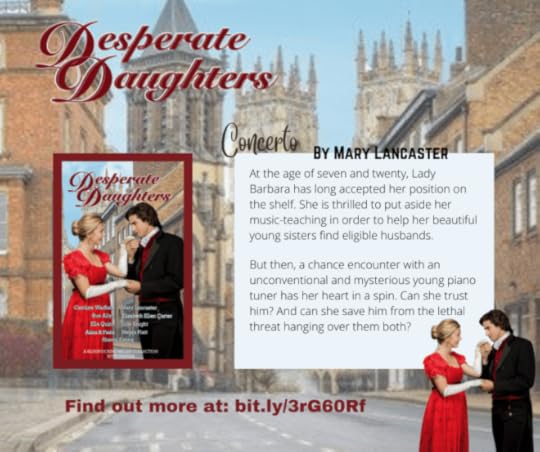
At the age of seven and twenty, Lady Barbara has long accepted her position on the shelf. She is thrilled to put aside her music-teaching in order to help her beautiful young sisters find eligible husbands.
But then, a chance encounter with an unconventional and mysterious young piano tuner has her heart in a spin. When she encounters him again at a York assembly, playing the violin, it seems he has too many names. Can she trust such a man with the family secrets, let alone with her heart? And can she save him from the lethal threat hanging over him?
And 8 other great stories.

Oddly, Barbara was conscious of a desire not to return to York. To let her sisters go on without her, just for a few days. But even if Jack wished it, she could not stay here.
So, after tea they said goodbye to Mrs. Weeks. Jack even hugged the housekeeper, which made her cry, and then they walked around to the stables.
“What did you think?” Jack asked casually on the way.
“I think it is a beautiful house which you can make your own. I think you can make it ring with music and fun, and compose to your heart’s content. In between seeing to the land and your tenants. You could have the music and Allbury Court.”
“That is what I have begun to think.” He paused, catching her arm and turning her to face him in the shade of a spreading chestnut tree. A smile played on his lips. With his free hand he tucked a stray strand of hair beneath her bonnet, and brushed his knuckles against her cheek. “Thank you.”
“For what? Telling you what you already know?”
“For making me see what I already know,” he corrected. “Barbara?”
“Yes?”
The smile flared and died again. “Nothing. Just this.”
He bent his head and her heart seemed to lurch downward into her suddenly tingling stomach. She could have avoided it, but the truth was, in that moment, she wanted his kiss more than anything in the world.
His lips paused above hers, giving her time to object, perhaps, or maybe just drawing out the anticipation. She parted her lips, raising them to his, and he smiled as he kissed her. A firm, yet tender kiss, slow, exploratory, tasting.
He raised his head, searching her face. “Again?” he whispered.
For answer, she cupped his cheek and took back his mouth and with this longer, deeper kiss, she was lost.

See the project page at the Bluestocking Belles’ website for more information.
Desperate Daughters is on preorder for publication on 17 May. Order now to get the preorder price of 99c
March 24, 2022
An Animated History of Ukraine
I offer this for what it is worth. It has to be a simplification, being a short overview of more than two thousand years, but the key points seem consistent with what else I know.
March 22, 2022
Journeys on WIP Wednesday
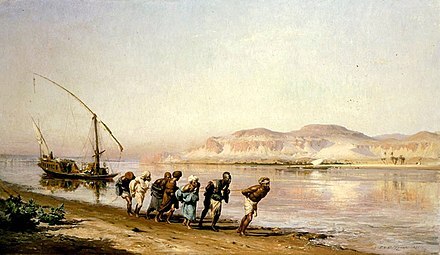
I seem to get a lot of travel into my books, one way and another. My hero in the book I’m writing at the moment has been overseas since his twenty-first birthday. He is now a week shy of his thirty-seventh. My excerpt is part of his journey home (They departed from Ceylon — today’s Sri Lanka — by ship to what we today call Pakistan, then went up through Kashmire to Afghanistan and from there to Kazakhstan. I had to work out the timings, allowing for the monsoons and the northern winter. I think I’ve got it. If you have a journey in a book of yours, please share in the comments.
Nowhere smelled like England. It was raining, but Ash rode anyway, the better to enjoy the sights, smells, and sounds of his homeland. His childhood memories were created in the tame and gentle lands of South East England, the lands their little line of carriages and horsemen were currently traversing on their way from Dover to London.
Artie had put his riding horse on a lead rope when the rain first began, retiring to the family carriage where Rithya, Caroline, and little Gareth travelled in as much comfort as Artie could procure at short notice.
Caroline had been born in March of 1817. Artie had taken a house in a small village in Kazakhstan when Rithya adamantly refused to travel any further while she was, as she complained, larger than an elephant and far less useful. Besotted with his baby daughter, Artie had quelled his restlessness until Rithya pronounced herself well enough to travel. They set off again, with a wet nurse, he is a train of pack animals and a small army of local guards.
After that, Artie travelled as if possessed. No more stopping for weeks or even months at a time, to see the sights and get to know the locals. “I want to leave St Petersburg before the Baltic ices over,” he explained.
In Turkmenistan, they heard about an Englishman who ran shipping on the Caspian Sea, paradoxically known as the King of the Mountains. The man they found in a small port on the eastern shores proved to be the son of the rumoured king, though from his looks, his mother had been a local. He was able to supply space for their party on a ship sailing for the mouth of the Volga River, and also advice on dealing with Russian officials as they travelled up through the waterways of that enormous empire.
The river travel took longer than expected, and they spent Christmas at the Winter Palace of the Tsar in St Petersburg.
Tsar Alexander was delighted with his visitors, whom he proclaimed he knew well, for he had read all of their books. Artie, in particular, was a favourite, his birth making him, in the Tsar’s eyes,’his British cousin’.
The nearby port was frozen over. Indeed, the ice blocked much of the sea for hundreds of miles. The Tsar assured them they could stay as long as they wished, but Artie insisted on taking an overland route, by troika, to Klaipeda, which was ice free. Somehow, he managed to charm the vehicles and their teams, an escort, and a ship out of the Tsar.
Perhaps it was because Rithya was with child again, and the childless Tsar and Tsarina were enchanted with Caroline, and anxious to do all they could to make sure Artie was back in England “for the birth of your heir, my cousin.”
So, at last, in the middle of February, after being storm-diverted to Calais where Rithya gave birth to Gareth, they arrived in Dover.
Travelling by gentle stages, they spent two nights on the road and were now approaching London. Their sixteen-year journey was all but over.
March 20, 2022
Tea with Lord Cranfield

Richard’s cravat was too tight. It had been perfectly fine when his valet tied it, but somewhere between his townhouse and this encounter with the Duchess of Haverford, it had shrunk. To be precise, it had shrunk at that moment Her Grace caught sight of him and beckoned him to her side.
“Go and take a stroll around the room, dear,” she said to her companion. “I have been hoping for a private word with you, Lord Cranfield. Please sit.”
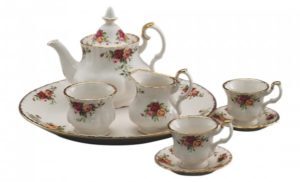 Richard obeyed. One did not refuse the Duchess. Besides, he rather liked the old lady, at least in part because his mother and father could not stand her.
Richard obeyed. One did not refuse the Duchess. Besides, he rather liked the old lady, at least in part because his mother and father could not stand her.
“Will you have tea?” she asked. In this vast room, all the refreshments were being served buffet style at one end of the room and most of the guests clustered at that end. Her Grace of Haverford sat at the other end and had somehow secured a table with a pot of tea, a plate of savouries, and another of sweet cakes.
“Yes, please,” Richard said, thinking it would be good to have something to do with his hands.
She asked how he preferred it, made it for him, and served it, also passing him a plate and inviting him to help himself.
He was taking his first sip when she said, “I have been told, Cranfield, that your parents are sending you to York to find a husband for your sister and a wife for yourself.”
Richard managed not to spray tea all over his lap, but it was a near thing. “How did you…? Never mind.”
“Never mind, indeed.” Her smile was kindly. “Good luck with your quest, my dear. I just wanted to give you a piece of advice, based on my experience. Your sister is a wise woman. She has refused to marry for a title and wealth, as your parents wanted. She is waiting for someone she can respect; someone who respects her.”
“She is waiting for love,” Richard corrected, wondering how the duchess came by her information.
She nodded at his remark. “I know you are a loving brother, and I trust you to honour her choices. I just wanted to tell you that she is right to be careful, Cranfield. Marriage is for a lifetime. I know you think I am an interfering old woman, and perhaps you are right. But I have observed many marriages over my lifetime.” She leaned forward to emphasise her point. “People think that women have the most to lose when a marriage turns sour, and they are right. But men lose, too. Choose wisely, my dear. Choose someone who can be your partner in life’s adventures, your friend and companion.”
She sat back. “There. That is my lecture done for the day. Finish your tea, dear boy. Or don’t, if you are anxious to escape. I will not be offended.”
Richard, relieved of the threat of more advice, relaxed. “Your son Haverford seems happy in his marriage,” he observed. Now that his cravat had loosened, perhaps he would have a savoury.

Richard, Viscount Cranfield is the hero of Sherry Ewing’s “A Countess to Remember”, a story in Desperate Daughters. On preorder now. Only 99c until publication.
